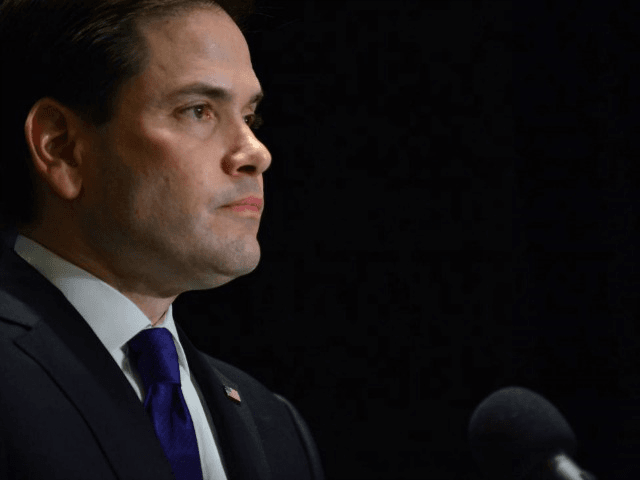The Miami Herald reported Sunday that a memo circulating among relevant law enforcement revealed evidence that Diosdado Cabello, an alleged drug lord and once Venezuela’s second-in-command, ordered the assassination of U.S. Senator Marco Rubio (R-FL).
A defecting senior chavista official once branded Cabello the head of the notorious “Cartel de los Soles” multinational cocaine trafficking operation, while Rubio himself has referred to Cabello as “the Pablo Escobar of Venezuela.” In addition to his position in the fabricated “national constituents assembly” created to rewrite the constitution to benefit dictator Nicolás Maduro, Cabello hosts the television program Con el mazo dando (“Hitting with the Mallet”) on state television.
According to the Herald, a law enforcement memo “disseminated last month by the Department of Homeland Security” accused Cabello of issuing an “order to have Senator Rubio assassinated.” The memo did not provide details and instead noted that “no specific information regarding an assassination plot against Senator Rubio has been garnered thus far.”
The memo reportedly indicated that Homeland Security had evidence that Cabello had contacted “unspecified Mexican individuals” to plot Rubio’s murder. The socialist Venezuelan government has long been suspected of ties to Mexican drug cartels, though the U.S. Treasury has only officially linked the nation’s vice president Tareck El Aissami, not Cabello, with the Mexican Zetas cartel.
The Herald noted that neither the Venezuelan government nor Rubio’s team returned calls to confirm the memo. The senator has recently taken on more security in the nation’s capital and in his home state of Florida, particularly noticeable after the memo was issued. Fox News also confirmed that Rubio had expanded his security detail recently, perhaps in response to the threats.
Rubio has been among the most vocal voices in the U.S. government condemning the violent Venezuelan socialist regime, which has systematically used state violence to kill, torture, and maim peaceful anti-socialist protesters. The Venezuelan outlet Runrunes has documented 157 deaths since late March, when protests erupted, and have continued on a daily basis objecting to the Maduro regime’s attempts to strip the opposition-held National Assembly of its power.
Rubio recently referred to Cabello as the “Pablo Escobar of Venezuela” at a Senate hearing last month but has repeatedly branded the Venezuelan official one of the more sinister characters in the nation’s post-Hugo Chávez landscape:
In response, Cabello has resorted to calling Rubio “Narco Rubio,” without presenting any evidence that Rubio is involved in any illicit activity. The two regularly trade barbs on Twitter, where Cabello maintains a presence largely due to his television hosting duties.
The accusations against Cabello for drug trafficking largely stem from the testimony of Leamsy Salazar, a former personal bodyguard to the late Chávez who defected to the United States. In 2015, Salazar told media that Cabello was not only involved in drug trafficking, but the head of the Cartel de los Soles. Cabello responded by claiming he had minimal contact with Salazar, too little for him to have sufficient knowledge to make the accusations in question, and suing the Wall Street Journal for publishing the allegations and a claim the United States was investigating Cabello personally.
The Wall Street Journal responded to the suit by asserting twelve different sources had confirmed American officials were aware of investigations into Cabello’s alleged drug-smuggling.
In addition to the Salazar claim, former Assistant Secretary of State for Western Hemisphere Affairs under George W. Bush Roger Noriega asserted he had evidence that Cabello had helped pay for Maduro’s presidential campaign with drug money, while two of Maduro’s nephews accused Cabello of trafficking cocaine. Franqui Francisco Flores de Freitas and Efrain Antonio Campo Flores, nephews of First Lady Cilia Flores, were arrested in late 2015 in possession of a cocaine shipment they initially claimed belonged to Tareck El Aissami, but later asserted was the property of Diosdado Cabello.

COMMENTS
Please let us know if you're having issues with commenting.